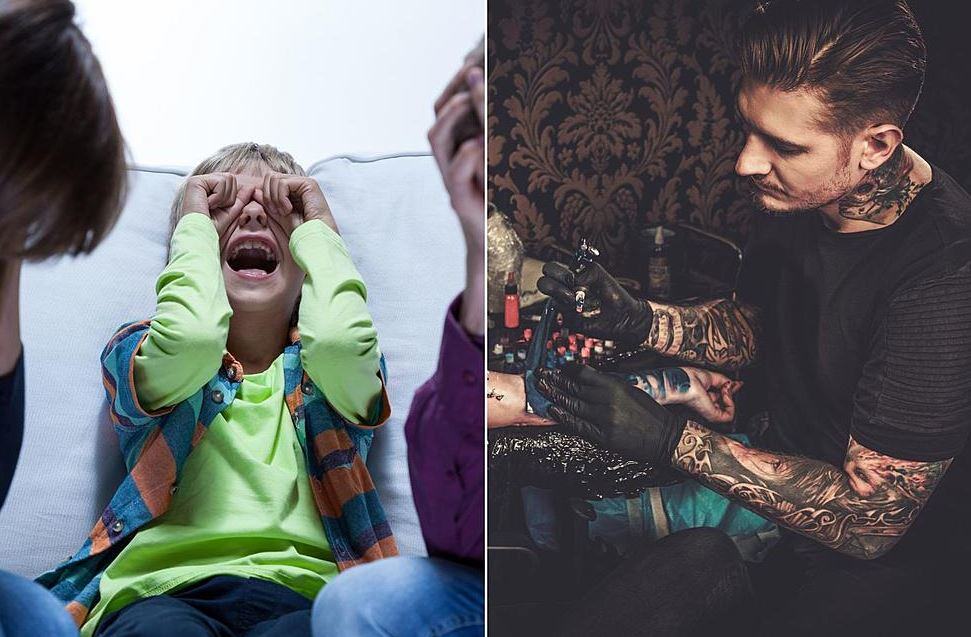A 10-year-old kid strolled into the nurse’s office at his Highland, New York, elementary school last month and requested some Vaseline. He wanted to rub it over his new tattoo, which was a rough representation of his name in enormous block characters on the inner forearm.
The nurse contacted authorities.
Local officials report that the youngster received the tattoo with his mother’s approval from a neighbour. While some states have no minimum age requirement for having a tattoo if a parent consents, New York State prohibits anybody under the age of 18 from receiving a tattoo with or without parental consent. Both the unlicensed tattoo artist, Austin Smith, 20, and the boy’s mother, Crystal Thomas, 33, were detained last month after images of the boy’s tattooed arm sparked anger on local and international news sites and social media platforms.
Yet, as cultural norms around tattooing change — over half of all millennials have tattoos, while just 13 percent of boomers do, according to a 2015 Harris Poll poll — there is a broad range of attitudes to tattoos on young people. There is no federal minimum age for tattoos, and state regulations regarding tattoos vary greatly. Some resemble New York’s high age restriction of 18. Some allow tattooing for persons as young as 14 with parental approval. About a dozen states, including Ohio, West Virginia, and Vermont, do not define a minimum age for parental consent.
It is a scenario that concerns Dr. Cora Bruener, a paediatrician and professor at the University of Washington Medical Center’s Seattle Children’s Hospital, as well as the author of the American Academy of Pediatric Medicine’s guidelines on tattoos for physicians.
Marisa Kakoulas, a lawyer based in New York City who has authored a series of books on tattoos and advises with artists on tattoo law, said that the concerns surrounding children and tattoos are expected to get more attention as tattoos become more common. In fact, the New York child said that he was motivated to get a tattoo on his forearm because a cherished teacher had one in the same location.
Ms. Kakoulas said, “It appears the first answer should be ‘No, kids should not have tattoos,’ yet minors will get tattoos.” She said that some parents may be unaware that they are violating the law in some areas when they agree to their children’s tattoos.
This was the situation when Gaquan, Chuntera Napier’s 10-year-old son, approached her with what she considered a touching request: he wanted to get a tattoo in memory of his elder brother, Malik.
In 2010, Malik, age 12, was killed in an automobile collision while playing with Gaquan in front of their Macon, Georgia, house. According to his mother, the seventh-grader was a standout basketball player at Ballard Hudson Middle School and taught his brothers their multiplication tables by creating mathematical sports games.
Shortly after Malik’s death, Gaquan requested the number 3 from his brother’s basketball jersey to be tattooed on his arm. His mother stipulated.
When instructors at Gaquan’s primary school saw the tattoo, Ms. Napier was reported to the authorities; in Georgia, it is unlawful for anybody under the age of 18 to get a tattoo. According to court documents, Ms. Napier pled guilty to tattooing a juvenile and was sentenced to one year of probation.
Limiting tattoos to adults is a relatively recent Western custom, according to Lars Krutak, a tattoo anthropologist and research associate at the Museum of International Folk Art in Santa Fe, New Mexico, who has researched tattoo culture in 50 Indigenous groups across 30 nations. From Japan to Kenya to Borneo, he said, children’s tattoos signified life phases, served as tribal identities, and were considered to have medicinal or therapeutic benefits.
According to Dr. Lodder, legislation restricting tattoos was motivated by health concerns over unhygienic practices and notions of moral appropriateness. Even a century ago, tattooists debated whether or not the practice was acceptable.
Ms. Thomas, a parent from Highland, New York, near Poughkeepsie, characterised her situation as a misunderstanding. She said that she supported age restrictions and had incorrectly assumed that her kid had requested permission to have a temporary tattoo. She said that no youngster should be tattooed. She has been charged with endangering a child’s welfare.
A few days after being charged in Lloyd Justice Court on accusations of improperly dealing with a minor, a misdemeanour punishable by up to a year in jail, Mr. Smith, the tattoo artist, expressed guilt about having tattooed the 10-year-old.
